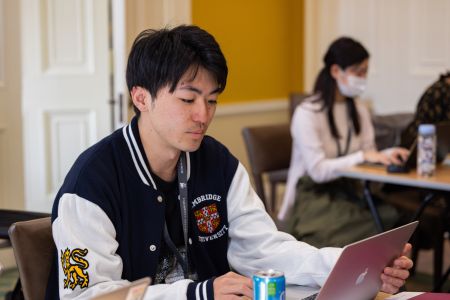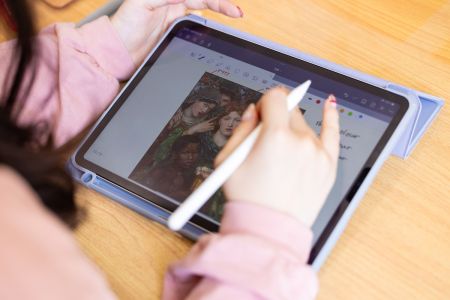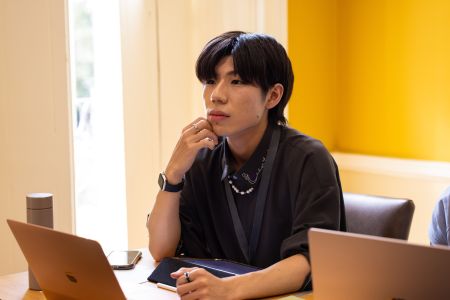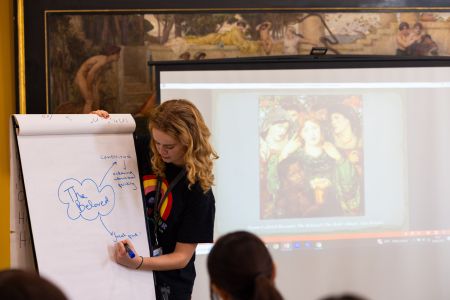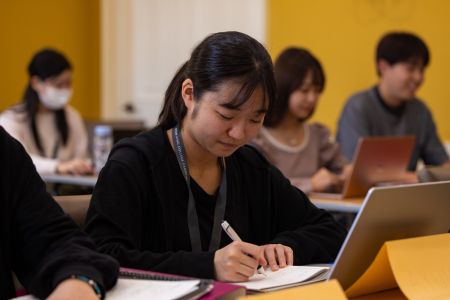Subjects (18+)
Subjects
Course Overview
The programme aims to provide undergraduate students with the unique experience of attending a Cambridge College and learning about topics either as an extension to their undergraduate course or to broaden their context in a range of subject areas.
Courses on offer are:
- Contemporary Art
-
In 2016, British polling company YouGov showed 4,066 people across the United Kingdom images of fifteen historic, mid-20th century, and contemporary works of art and asked a simple question - ‘is this art’? Less than half the respondents thought that celebrated works by Marcel Duchamp, Andy Warhol, Jackson Pollock, and Mark Rothko were art. Duchamp and Tracy Emin shared the bottom spot, with only 12% of respondents accepting that Fountain (1917) or My Bed (1998) could be considered art. The only three works that over 90% of respondents considered art, were the Mona Lisa (1503-4), Jack Vettriano’s straight-to-calendar painting The Singing Butler (1992), and legendary painting instructor Bob Ross’s Mystic Mountain (1990). Picasso’s Guernica (1937) could only manage 78% and Roy Lichtenstein’s Wham (1963) squeezed into the ‘mostly art’ category at 67%.
Does art matter less to people now than it did in the past? Has it just got worse? Can you appreciate Modern and Contemporary Art without context? Or are we simply asking the wrong questions? Whatever the reason, the undeniable fact is that art audiences and museum goers in the future will see the artistic production of the twentieth and twenty-first centuries represented by Duchamp, Picasso, Pollock, Warhol, Rothkno, Emin, Hamilton, and numerous others whose work doesn’t register as art with most people today. Not engaging with the art of today (and the recent past) impoverishes us all and leaves us out of important dialogues with the future.
The Contemporary Art: Future Collections course will be a rollercoaster ride through some of the most important issues around our art and what it says about us, with all the anticipation, cliffhangers, terror, and sense of achievement of a fairground ride. Daily lectures will cover themes such as the philosophy of depiction, traditional and time-based media, artist geographies, propaganda, protest, inclusivity, art for a dying planet, and collecting for the future. Workshops will involve independent and group research, museum and gallery visits, studio visits, and exhibition reviews; all of which will culminate in an exhibition design project for The Heong Gallery space, which you will present to your peers in Downing’s state-of-the-art Howard Theatre.
- Healthcare and Biotechnology
-
Increasing capability for developing new tools for diagnostic and prognostic applications in medical sciences, are now presenting new challenges for disease treatment and management. This course aims to provide an overview of the current challenges in Science and the importance of key aspects that are essential in addressing the needs for an evolving global population.
In this course we will discuss current developments in healthcare, and how our basic understanding in Biology has evolved over the past two decades. Key aspects on what are the current capabilities in concepts such as Drug Discovery and Development are discussed as well as their shortfalls highlighted. In addition, an overview of the current challenges that are faced by scientists will also be discussed, as well as the need to develop technologies to address current and future demands; from tackling diseases such as cancer and outbreaks such as Ebola to addressing issues of the global ageing population.
Week One, ‘Discovery Biology’ will provide basic knowledge and tools used in Research and Development. We will cover topics including gene structure and functions; proteins, carbohydrates and lipids structure and functions; and cellular/Animal models used in discovery biology; as well as tips on how to write a scientific assay/paper.
Week Two, ‘Research and Development (R&D)’ will go through processes from Laboratory to Patients. Lecturers will be on healthcare and Biotechnology; Pre-clinical studies; Human clinical studies and introduction to personalised medicine; Biomarkers & companion diagnostic; Current & future directions for Healthcare & Biotechnology industries; and conclude the course with workshops on selecting a disease to treat; Drug discovery; and Clinical trials in humans.
- History of Art
-
Towards the end of the Second World War, when the National Gallery’s collections had been moved out of London to safety in a Welsh slate mine, one painting per month was brought back and displayed to the public. The gesture caused a sensation! Up to 300,000 people, starved of art for so long, flocked to see the exhibits.
What part does seeing paintings in museums play in your life? Has your attitude changed since the pandemic? Is viewing art online an adequate substitute? What factors determine your personal response to a work of art? Does art produced in Great Britain have distinct qualities or characteristics? What do you think about iconoclasm or public art?
The course “Highlights of four centuries of painting in Britain” will give you an opportunity to think about these and other questions as we delve into aspects of painting in Britain from the sixteenth to the nineteenth centuries. Short daily lectures will spotlight topics such as portrait painting in Tudor England, the art of the Stuart Court, landscape painting in the eighteenth century, the “Grand Manner” portrait and the art of the pre-Raphaelite brotherhood. We will analyse how paintings relate to their historical and cultural contexts, focusing on artists such as Holbein, van Dyck, Gainsborough, Hogarth, Constable, Reynolds, Turner and Rossetti, who without exception changed and innovated painting. To consolidate the classroom work, we will visit Kings College Chapel and the Fitzwilliam Museum.
Course members will be provided with glossaries of relevant art historical terms and vocabulary, as well as reading material from various sources. There will be discussions on developing general study skills such as reading a text, and communicating effectively with others in the classroom and in front of an audience. Students are expected to participate fully in class discussions, giving occasional brief classroom talks and culminating in a presentation and a short piece of written work based on independent research at the end of the course. The preparation of these will be supported by the tutor and teaching assistant.
Join us to discover how the visual culture of Britain in past centuries has developed.
- International Management
-
The International Management course will introduce you to the key management issues by exploring the context within which modern international organisations function. Only by understanding the central issues in international trade and global business managers can they determine their objectives and implement the most effective strategies to ensure sustainable development of a company. The course examines political, economic, socio-cultural, and environmental factors that influence modern organisations. We will explore the rules, structures, processes, and ethical frameworks by which organisations are directed and controlled. The course will also include assessment of the challenges and opportunities that modern organisations face when they engage with digital innovations, artificial intelligence (AI) and machine learning (ML) technology. The course expands on these key issues and, most importantly, explores how firms can perform their central functions considering the fast-changing nature of the international business environment.
The course bridges the theoretical elements and the managerial implications of international management. It is aimed at students from a range of academic backgrounds to develop an understanding of the modern business environment. Interactive lectures and engaging activity-based exercises of the course have been carefully designed to provide a positive student-centred learning environment.
The course consists of ten lecture sessions to encourage student engagement with the course material, and associated seminars to ensure the understanding of the course content. In addition to the lecture material, extracts from book chapters, journal articles, podcasts, news reports, and video material will be provided before and after each session. In order to share the managerial expertise and enrich the curriculum, the course offers an opportunity to discuss successes and failures of management journeys with inspiring guest lecturers – successful entrepreneurs and business leaders across a range of industries.
The course equips you with the relevant skills and knowledge to embark on your own Team Consulting Project (TCP) to research and build solutions to a real company business problem. Accordingly, students’ engagement in the course and their progress are formally assessed to help reflect on their academic abilities. All students enrolled on the course are supported by the experienced lecturer and teaching assistants who provide continuous feedback on the development of student skills and competencies.
- International Relations
-
Why do wars happen? How can we bring about peace? Why didn’t experts predict the end of the Cold War – or did it never go away? Why don’t countries get together to tackle issues like climate change that affect us all? How do social media networks impact international politics?
These are all issues that form the field of study of the academic discipline of International Relations. ‘IR’ helps us understand the complex world in which we live, and this course will give you an interesting, enjoyable and rewarding introduction to the subject.
After looking briefly at how today’s international system developed, we will consider the role of states and other international actors. We will then look at issues that affect the whole world, including pandemics, global warming and economic inequality. Against this background, we will consider how states develop their foreign policy, before moving on to the complex question of violent conflict and what ‘we’ may try to do about it. Although we will come across a number of theoretical concepts as we consider these various issues, we will save our examination of the different – often competing – attempts to develop theories of international relations until the end of the course.
You will have the opportunity during the course to do individual and group research into specific areas of international relations, and to share your research both in an essay and in one or more presentations. So you will be developing your research and communication skills, supported by the lecturer and teaching assistants.
The core of the course is a series of eight lectures, each followed by a workshop session and supported by carefully chosen reading material. The readings vary in nature; some are magazine articles, others extracts from books, yet others more formal articles from academic journals. Other workshop sessions will focus on helping you build up your transferable skills: researching a topic; working with others; extracting the most important ideas from a complex article; conveying your meaning accurately in writing; and speaking confidently and clearly.
You will be assessed on the basis of your participation in discussions, an original individual essay and your contribution to presentations.
The programme will include a series of expert lectures and workshops from subject leaders and academics. Each course is designed to be challenging but accessible and will be assessed in order to provide students with a graded certificate at the end of the programme.
Each course is designed to cover a 2-week timetable programme including a series of compelling lectures, workshops and assessments. Students will have a total of 25 hours of contact time over these two weeks for each course.
As class sizes are capped at 20 places, please list subject choice in preference order so we can do our best to place you in a class that best fits your interests.

